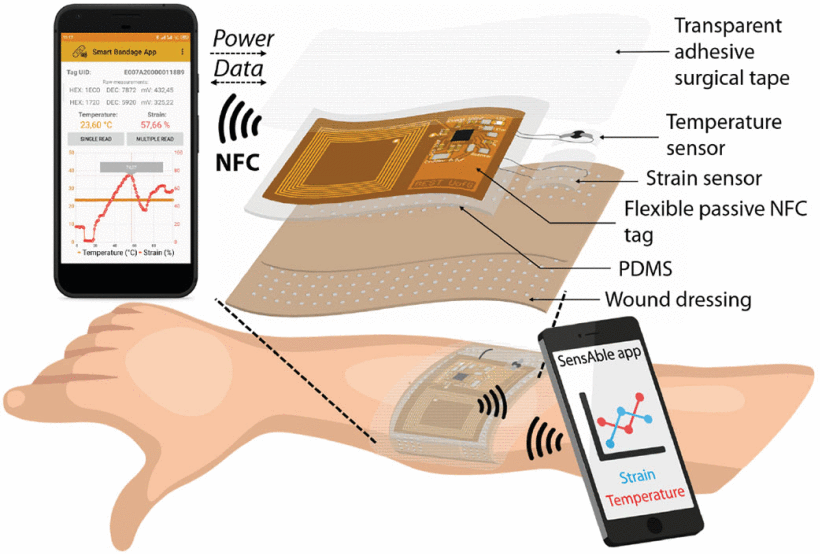Smart Bandage With Wireless Strain and Temperature Sensors and Batteryless NFC Tag
Non-invasive monitoring in wearable systems provides viable and comfortable health monitoring services to patients. Recently, bandages have attracted much attention as a viable biosensor platform. Certain health conditions impair the wound healing processes, leading to complications after surgeries or injuries. It is possible to predict wound healing states by monitoring parameters such as temperature, pressure, pH, acidity, etc.
The researchers present a smart bandage prototype incorporating sensors to measure pressure and temperature and an NFC tag for wireless power supply and data transmission.
A microchannel-based pressure sensor was designed and fabricated using PEDOT: PSS (poly(3,4-ethylene-dioxythiophene) polystyrene sulfonate) as the sensing material and PDMS (polydimethylsiloxane) as the substrate. This sensor records the increase in resistance due to defects and electrical discontinuities in the PEDOT: PSS within the microchannel due to strain application. The pressure sensor showed a high gauge factor (relative change in resistance to the mechanical strain), almost 12,000 per percentage of stretching.
The temperature sensor is a two-electrode system fabricated by layering conductive silver paint on a commercial Polyvinyl Chloride (PVC) substrate. A sensing layer of PEDOT: PSS was added in the gap between the electrodes. The system monitors the changes in sensing layer resistance due to temperature variations. The sensor showed a sensitivity of 1.2 % for each degree Celsius change within a temperature range of 25 oC to 85 oC, adequately covering body temperature variations.
The NFC ISO15693 sensor transponder from Texas Instruments was used for energy harvesting and data transfer with a customized NFC antenna. The antenna coil was customized to achieve a resonance frequency of 13.56 MHz, the central frequency in the NFC protocol. Its dimensions were determined using simulations in COMSOL Multiphysics and ADS (Advanced Design Simulator).
The passive strain and temperature sensors do not need any power source. The researchers employed an RFID (Radio-Frequency IDentification) interface for wireless programming and bidirectional data transfer. The NFC chip was used in passive mode to harvest energy and data recording from the external RFID available in the user's smartphone via a custom-made application, "SenseAble." The sensor measurements were accomplished through a resistive bias interface, which includes an analog-to-digital converter and a programmable gain amplifier. The data was then transmitted and stored in the specific memory location, which is accessible by an application through the NFC command. The data was then converted and calibrated as actual temperature and strain values. The typical reading distance was 1 to 5 cm for an NFC-enabled smartphone. The whole set-up was embedded within a transparent adhesive surgical tape to protect it from ambient conditions.
The smart bandage was tested on different body parts such as the thigh, wrist, and thumb to measure the minimum readable distance for the NFC tag and was found to be 41, 38, and 25 mm, respectively, which is not very different from the smart bandage put on a flat surface. The proposed system can be used for monitoring wound status or any other medical condition, like various respiratory diseases where temperature and strain are crucial biomarkers.




